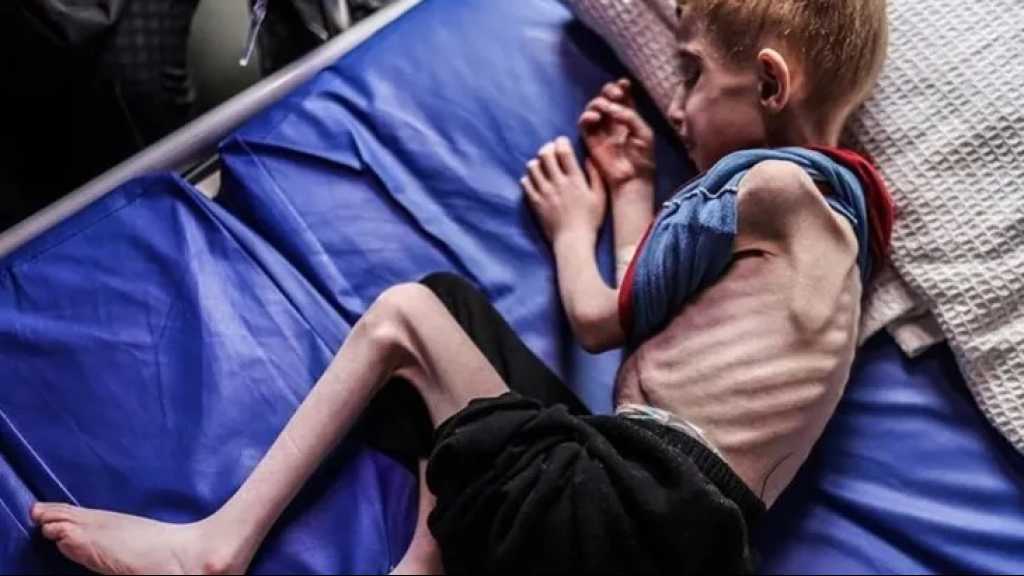Malnutrition Plagues Palestinian Children in Gaza

Translated by Al-Ahed News, Al-Akhbar Daily
By Matar Jabr Al-Zaq
Three-year-old Hanaa Abdel Rahman Al-Rai is just one of many emaciated children in Gaza. She suffers from chronic diabetes and malnutrition and doesn’t have access to proper treatment at the Al-Aqsa Martyrs Hospital [Shuhada Al-Aqsa Hospital].
She is a victim of both food insecurity and the crumbling healthcare system in Gaza. These conditions are a real threat to the lives of Gazans, especially children.
According to Gaza’s Government Information Office, 37 people, the majority of them children, died due to malnutrition and a lack of access to healthcare since the start of “Israel’s” genocidal war on October 7, 2023.
Hanaa’s father, Abdul Rahman, who was displaced with his family to the Zawaida area in central Gaza, told Al-Akhbar that “eating canned food in recent months resulted in many children becoming malnourished.”
“As the weeks and months passed following the start of the genocidal war, I was very surprised by Hanaa's weight loss. She had weighed 15 kilograms and suddenly her weight decreased to 9 kilograms, so we took her to the hospital.
“I searched a lot for the appropriate needles to treat Hanaa, to no avail, and I appealed to health and medical institutions without the ability to provide the necessary treatment. Therefore, the only way to save Hanaa’s life is for her to receive treatment abroad.”
Just a few meters away from Hanaa Al-Rai's bed, lies ten-month-old Youssef Al-Joujou. He is glued to the vaporizer because his body stopped growing.
“He is supposed to weigh 9 kilograms, but so far he has not exceeded 5 kilograms, and this poses a threat to his life,” Youssef’s mother tells Al-Akhbar, noting that he suffers from “red-level malnutrition as well as chest and blood infection due to the genocidal war and the closure of crossings, which have led to the unavailability of special milk for him.”
Youssef's mother searched endlessly for Sensitive milk formula, but to no avail. She tried three different alternatives. However, “each time, Youssef’s condition deteriorated, and his body became very weak and inactive.”
For his part, Dr. Sherif Matar, a pediatric specialist at Al-Aqsa Martyrs Hospital, tells Al-Akhbar that “there are different types and degrees of malnutrition. Those who died reached a severe degree due to the lack of safe, adequate, and healthy food. Consequently, the body enters a constant state of breakdown and does not produce sufficient antibodies.”
The doctor gives an example.
“Any bacterial infection that the body is afflicted with can be treated with a simple antibiotic, but due to malnutrition, the body becomes weak and does not have sufficient immunity to confront the bacteria, so severe complications occur, and the condition becomes complex, and the condition that requires a simple antibiotic will need strong antibiotics.”
Matar points out that war is “the main cause of malnutrition. The idea is not that the boy ate and was full, but rather what he ate. There is practically one type of food, which consists of bread and potatoes. There is no healthy or varied food, and the body needs complete food that contains minerals, proteins, and vitamins, and this does not exist in Gaza.”
“All Gazans suffer from malnutrition, but the repercussions are more severe in children because they do not have sufficient stores of vitamins, proteins, and minerals.”
He explains that the problem is “worse than people imagine, as there are therapeutic types of milk” that are not available.
“People use types of milk that are not suitable for their children, such as UNRWA milk for a child who is 3 or 4 months old, and this harms the intestines and causes allergies and many problems.
“Lactose-free milk does not exist, and this is necessary for children who suffer from lactose intolerance and chronic diarrhea,” while “there are cases that respond to soy milk, and this is impossible to obtain now.”
Also, there are medical cases that suffer from blood acidity and high protein, and these people “have not had their types of milk since the start of the war,” according to the doctor, who also points out that “there are cases of phenylketonuria (PKU). These patients need a specific kind of milk that contains protein. But it has not been available for eight months, and the problem is that the absence of this milk causes brain damage.”
He adds that “one of the children died due to the lack of an endoscope. […] The situation is getting worse because there are cases that require examinations abroad due to the lack of capabilities here, such as taking samples from the intestines for testing.”
Regarding the situation at the Al-Aqsa Martyrs Hospital, the doctor points out that “there is only one department for children."
“The capacity of the department ranges from 20 to 30 children [but] there are more than 85 cases in the department’s corridors, and there are dozens of cases we are not able to receive.”
In the face of this severe suffering, Matar appeals to “the entire world to stop the war, open the crossings, and provide food and ensure appropriate treatment.”
Comments




